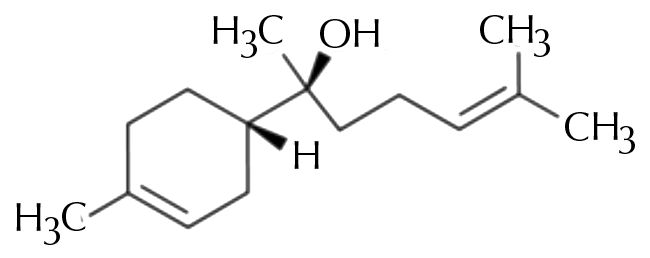What Is Bisabolol?
Bisabolol is a natural ingredient that is used in cosmetics and skincare products primarily as a fragrance. Bisabolol also has several other benefits to the skin such as soothing, antimicrobial, antioxidant, anti-aging, and skin-lightening properties.
Bisabolol also referred to as alpha-bisabolol, is a monocyclic sesquiterpene alcohol or a natural componenet of essential oils. It is a colorless, viscous oil that is a major component of the essential oil derived from German chamomile. Bisabolol may also be synthetically produced, however, synthetic bisabolol possesses only about 50% activity compared to the natural form of bisabolol.
Bisabolol has been studied for its skincare benefits. Bisabolol may help to soothe irritated skin, acts as a potent antioxidant, protecting the skin from free radical damage, and helping to improve the visible signs of aging. Bisabolol may also have anti-microbial properties and has been used to lighten the skin.

Bisabolol
the good:Bisabolol is a natural ingredient that is used in cosmetics and personal care products as a fragrance that also has soothing, antimicrobial, antioxidant, anti-aging and skin-lightening properties.
the not so good:Bisabolol, like many essential oils, may cause irritation in some skin types.
Who is it for?All skin types except those that have an identified allergy to it.
Synergetic ingredients:Works well with most ingredients
Keep an eye on: Nothing to keep an eye on here.
What Are The Benefits of Bisabolol?
Bisabolol has a sweet floral aroma with hints of citrus and spice, which is why it is used in many fragrances and personal care products. Bisabolol also has skin-soothing and healing properties. In fact, bisabolol has been used for hundreds of years in cosmetics because of its skin healing properties.
Soothing
One way that bisabolol helps to improve the condition of the skin is through its anti-inflammatory properties. A 2014 study found that when topically applied, bisabolol inhibits proinflammatory cytokines in mice. Cytokines are the molecules most associated with inflammation. By inhibiting these cytokines, skin inflammation and irritation may be reduced. It is important to note that this research is only in the preliminary stages and doesn’t indicate a causational relationship. However, this is one reason that bisabolol is included in healing creams and ointments, as well as skincare products for sensitive skin.
Antimicrobial
Bisabolol also possesses anti-microbial properties, which can help to prevent and treat skin infections. Several studies have determined that bisabolol has potent fungicidal and bactericidal properties against certain strains of fungi and bacteria. This is especially important for the stability and longevity of skincare and cosmetic products. Ensuring that products remain contaminant-free and have a long shelf life is an important part of skincare formulating.
Antioxidant
Bisabolol is thought to be a potent antioxidant. Antioxidants work by neutralizing free radicals, the unstable molecules that contribute to the formation of premature wrinkles and fine lines on the skin. Free radicals are produced by environmental factors such as the sun, smoking, and our diets. On a molecular level, free radicals damage important cellular components, such as the cell membrane, DNA, and important cellular proteins like collagen. Damaged collagen is a major factor in the appearance of aging skin. Therefore, by using topical antioxidants like bisabolol, the skin may be protected from the damaging effects of free radicals.
Pigmentation and skin lightening
Research has also indicated that bisabolol may inhibit melanin synthesis. Melanin is a pigment that gives our skin color. Certain skin conditions, as well as excessive exposure to UV radiation, can lead to the overproduction of melanin, which is called hyperpigmentation. By inhibiting melanin synthesis, bisabolol can help to reduce the appearance of undesirable dark spots on the skin, leading to a brighter complexion and more even skin tone. This effect was shown in a 2010 study investigating the treatment of the bisabolol-containing creams. In the study the pigmented skin was significantly lightened for the majority of the subjects who tested the cream.
Absorption
The final function of bisabolol in cosmetics and personal care products is to enhance the absorption of other ingredients through the skin. This is why bisabolol is often combined with active ingredients that are unable to penetrate the skin effectively on their own.
Is Bisabolol Safe?
The safety of bisabolol has been assessed by the Cosmetic Ingredient Review Expert Panel, a group responsible for evaluating the safety of skincare and cosmetic ingredients. In their review, they determined that despite bisabolol being well-absorbed into the skin there, there were no detrimental side effects such as toxicity or irritation. However, the Expert Panel noted that since bisabolol enhances the skin penetration of other ingredients, cosmetic manufacturers should exercise caution when combining bisabolol with ingredients that could be toxic if absorbed by the skin. Overall, the Panel concluded that bisabolol was safe as used in cosmetics and personal care products.
References:
Kamatou, G, Viljoen, A, 2010. ‘A Review of the Application and Pharmacological Properties of α-Bisabolol and α-Bisabolol-Rich Oils’, Journal of the American Oil Chemists Society, vol. 87, pp. 1-7. Cosmetic Ingredient Review, 1999. ‘Final Assessment on the Safety of Bisabolol’, International Journal of Toxicology, vol. 18, pp. 33-40.







